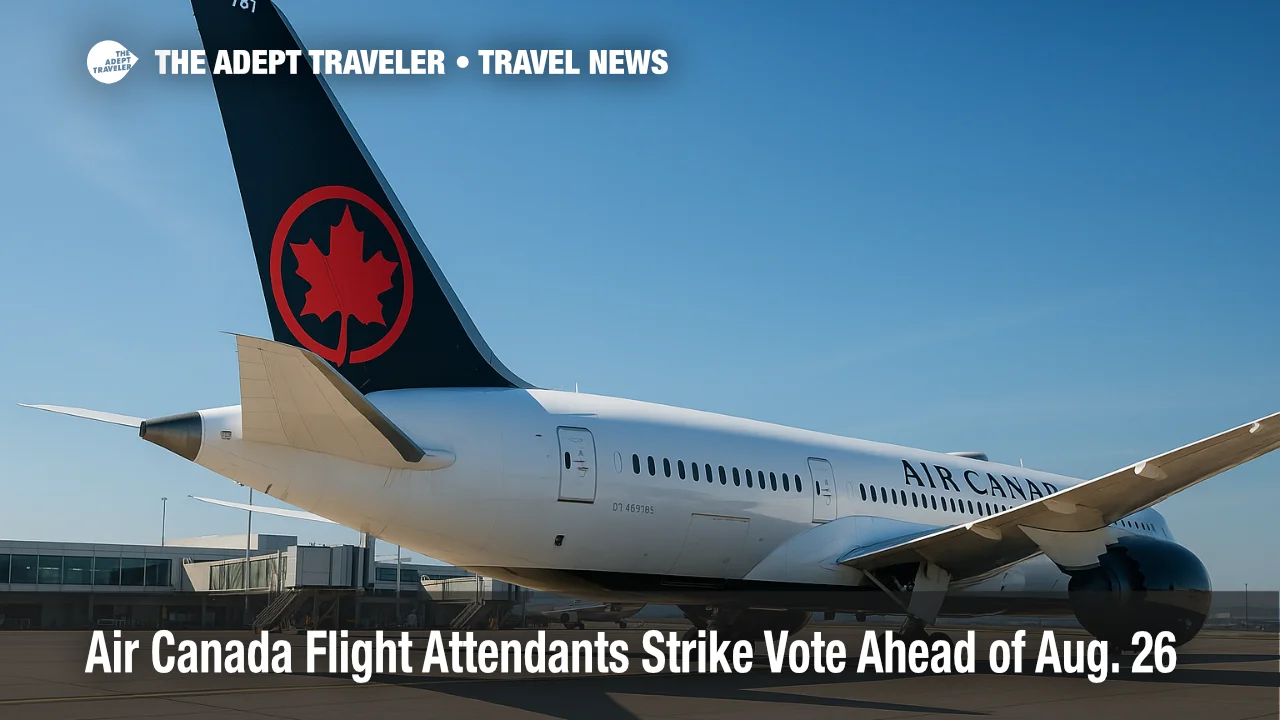Air Canada Flight Attendants Strike Vote Ahead of Aug. 26

Air Canada flight attendants open their strike-authorization vote today, raising the prospect of late-summer service headaches if contract talks remain stalled. Passengers with trans-Atlantic itineraries in late August could be caught in the middle if the union secures a mandate to walk out after the federally required cooling-off period ends. While negotiations continue under mediators, today's ballot is a crucial test of rank-and-file resolve and a warning shot for the carrier's busiest season.
Key Points
- Why it matters: A strike could ground peak-season trans-Atlantic capacity and snarl North American connections.
- Vote runs July 28 (1400 EDT) - Aug 5 (1400 EDT). ✔︎
- Legal strike position begins 16 Aug 2025 after a 21-day cooling-off period plus 72-hour notice. ✔︎
- Union represents 10 000 flight attendants at Air Canada and Air Canada Rouge. ✔︎
- Top issues: pay, unpaid work, rest rules, per-diems, pension. ✔︎
Snapshot
The Air Canada Component of the Canadian Union of Public Employees (CUPE) is balloting its 10 000 members after conciliation talks ended without a deal on July 24. Under Canada's Labour Code, the 60-day conciliation, a 21-day cooling-off period, and a 72-hour notice must all elapse before a legal strike. That timeline makes Aug 16 the first possible walkout date, yet union strategists could delay notice to maximise leverage-pushing any disruption closer to the traditional late-August surge in European traffic. Air Canada says it remains committed to mediated talks, but the vote outcome will determine how much bargaining power the union wields in the weeks ahead.
Background
Air Canada's current 10-year collective agreement expired on Mar 31 2025. Flight attendants argue wages have lagged inflation and highlight roughly 35 unpaid hours per month spent on pre-flight safety checks, boarding, and post-arrival duties. Conciliation began May 26 with four federal officers; ending that process triggered the statutory countdown now under way. Past labour showdowns at Air Canada were averted at the eleventh hour, but this round carries added pressure: soaring travel demand, thin spare capacity, and looming competition from rival carriers that recently inked richer contracts for frontline staff. Against this backdrop, CUPE's strong internal polling shows 89 percent support for strike action if needed. ✔︎
Latest Developments
Strike vote opens across Canada
Electronic and phone balloting launched at 14:00 EDT today via the Simply Voting platform. Members received new Elector IDs by email and mail, and the union is hosting daily Zoom briefings to push a "Yes" mandate. The component's tabulating committee will certify results shortly after polls close on Aug 5. A super-majority would give negotiators the green light to issue a 72-hour notice anytime after the cooling-off period. ✔︎
Key sticking points on the table
CUPE lists six unresolved pillars: base pay, elimination of unpaid duties, higher per-diems, improved pension contributions, safer scheduling rules, and enhanced prone-rest provisions on long-haul flights. The union argues entry-level full-time pay of C$1 951 per month is "impossible to live on" in major hub cities. It also wants compensation for mandatory safety tasks now performed off the clock. ✔︎
What travellers should do now
U.S. and Canadian travellers eyeing late-August European trips should monitor booking emails and set fare alerts. Historically, Air Canada has offered free re-accommodation or refunds when strike risk peaks, but award-seat partners and code-shares may fill quickly. Flexible tickets or mid-week departures can preserve options if seats tighten near the potential walkout window.
Analysis
Labour brinkmanship is nothing new at Air Canada, yet the stakes are higher this summer. Canada is on track for record overseas demand, and trans-Atlantic load factors already exceed 90 percent. Any service gap could funnel traffic to U.S. carriers and European competitors, eroding market share the flag-carrier fought hard to rebuild post-pandemic. For CUPE, timing the strike mandate around Aug 16-26 maximises leverage: peak loads, thin reserve crews, and limited spare aircraft make schedule recovery arduous. Management's challenge is to weigh wage costs against the existential risk of alienating premium customers during the tail-end of peak season. The union's focus on unpaid work resonates with broader public debates over hidden labour, potentially bolstering passenger sympathy. Still, federal mediators retain tools-up to and including binding arbitration-to forestall a shutdown if talks implode. In short, both sides face a narrow runway to compromise before travellers bear the brunt.
Final Thoughts
A decisive "Yes" in this week's ballot would hand CUPE the clout to strike just as Europe-bound flights hit yearly highs. Unless negotiators bridge the pay-and-work-rules gap quickly, mid-August could mark the start of tense countdowns and contingency timetables. For now, the best defence for vacationers is vigilance and flexible planning, as the clock ticks toward a possible Air Canada flight attendants strike.
